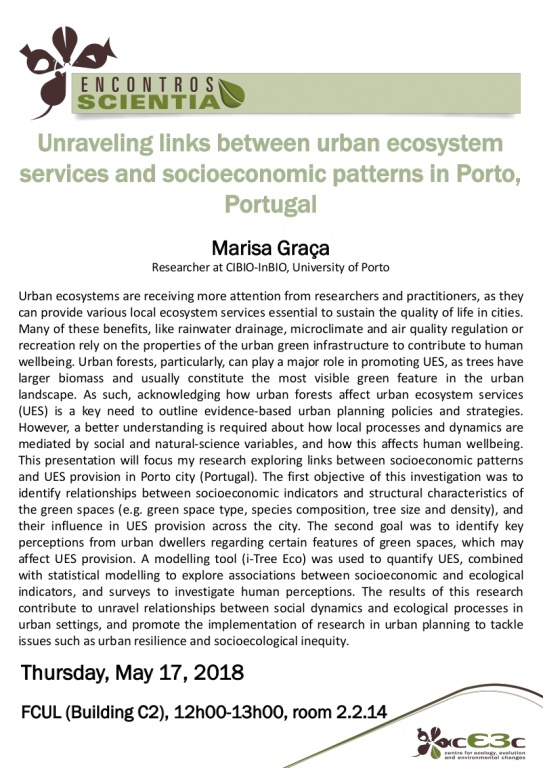Unraveling links between urban ecosystem services and socioeconmic patterns in Porto, Portugal
Marisa Graça
Researcher at CIBIO-InBIO, University of Porto
Urban ecosystems are receiving more attention from researchers and practitioners, as they can provide various local ecosystem services essential to sustain the quality of life in cities. Many of these benefits, like rainwater drainage, microclimate and air quality regulation or recreation rely on the properties of the urban green infrastructure to contribute to human wellbeing. Urban forests, particularly, can play a major role in promoting UES, as trees have larger biomass and usually constitute the most visible green feature in the urban landscape. As such, acknowledging how urban forests affect urban ecosystem services (UES) is a key need to outline evidence-based urban planning policies and strategies. However, a better understanding is required about how local processes and dynamics are mediated by social and natural-science variables, and how this affects human wellbeing. This presentation will focus my research exploring links between socioeconomic patterns and UES provision in Porto city (Portugal). The first objective of this investigation was to identify relationships between socioeconomic indicators and structural characteristics of the green spaces (e.g. green space type, species composition, tree size and density), and their influence in UES provision across the city. The second goal was to identify key perceptions from urban dwellers regarding certain features of green spaces, which may affect UES provision. A modelling tool (i-Tree Eco) was used to quantify UES, combined with statistical modelling to explore associations between socioeconomic and ecological indicators, and surveys to investigate human perceptions. The results of this research contribute to unravel relationships between social dynamics and ecological processes in urban settings, and promote the implementation of research in urban planning to tackle issues such as urban resilience and socioecological inequity.
Short bio of Marisa Graça:
Marisa Graça became a graduated landscape architect in 2004. Since then, she was involved in the development and coordination of several landscape architecture projects and studies ranging from public to private investments (public and private gardens, urban parks, institutional outdoor spaces, industrial facilities, landscape and urban planning, ...)., both within private offices and in the public local administration. Co-founder of Alpoad, Lda. in 2010. She became a researcher at CIBIO / InBIO in 2013, as a PhD student in the Landscape Architecture Doctoral Program of Faculty of Sciences (University of Porto), which she concluded in 2018. Her main research interests concern assessing, quantifying and mapping ecosystem services, and also landscape planning, management and design. Currently, besides developing research, she is a freelancer consultant.
Thursday, May 17 2018
FCUL (Building C2), 12h00-13h00, room 2.2.14

